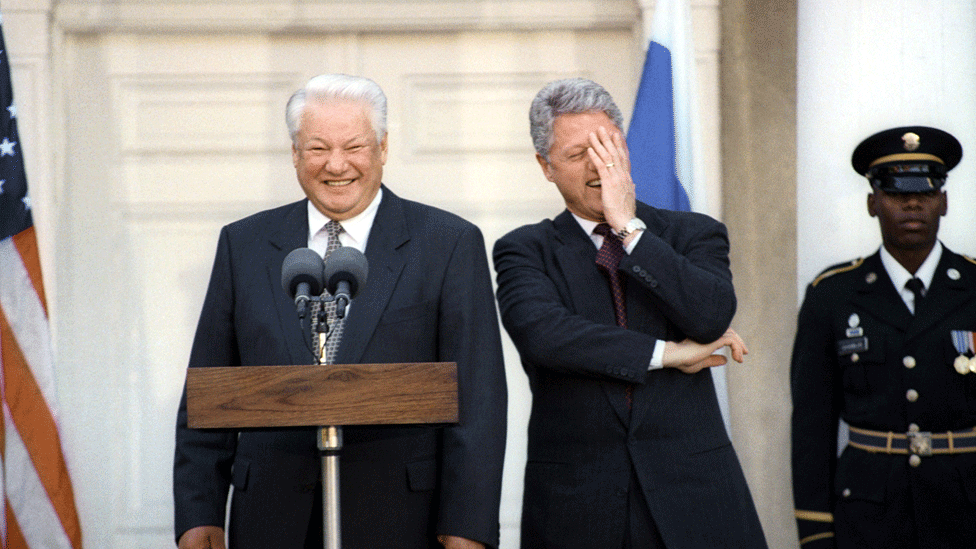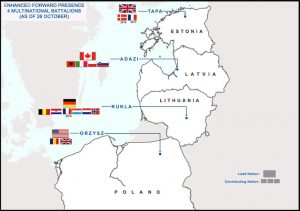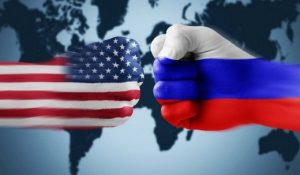
Views: 205
After the Cold War 1.0 (1949−1989) emerged many new problems in the international arena of global politics as the circumstances concerning international relations drastically have been changed. One of the many problematic issues that have been facing both the USA and Europe (in fact, NATO and the EU) after 1989 was to find a new way of their relations with a new post-communist Russia – a country in a historical political and economic transition. Russia after the Cold War 1.0 faced many stresses as it started to experiment with its position in the new world and new international relations which have been dictated by the American hyperpower position.
At that time, Europe was more divided than united over the fundamental constitutional provisions which would finally lead the EU toward a European super-state. Europe as well was facing several critical challenges of economic, political, and cultural nature. The leaders of Europe, but especially of the EU, not only have been confronted by older issues that they could not solve like Turkish membership of the EU, integration of European citizens of Islamic origin (some 13 million in 1991), or rising economic competition with both USA and especially China. The Europeans were aware of where they were coming from (of their historical roots), but on other hand, they did not have a clear vision of their way to the future, losing the plot of navigation. Only in 2003, the EU started to produce a more clear vision of its future through the adoption of the European Security Strategy which became at the same time the first serious effort in thinking about its international role under the new conditions of globalization and unipolar international relations.
In the 1990s, during an especially painful decade, Russia of Boris Yeltsin moved from being what it had once been after WWII under the cover of the USSR−a military superpower that could effectively challenge the US and its allies−to a declining power with diminishing both political and economic assets. As a direct result of its speedy adoption of Western-style (wild and brutal) privatization, Yeltsin’s Russia experienced consequences close to a 1930s-style Great Economic Depression. The focal negative outcomes have been the decline of industrial production, falling in living standards, and that whole regions previously devoted to military production during the Cold War now experienced an economic depression.
From the very global perspective, the foreign policy of Russia at the time of Boris Yeltsin was catastrophic as Russia lost even the position of great power in international relations. It was quite visible during the time of the destruction of the former Yugoslavia and especially during the Kosovo War in 1998−1999. Russian MFA did little to reassure many Russians who indeed understood Yeltsin’s decision to get close to Russia’s old historic Western enemies as he was selling out Russia to the West. However, outside Russia, the such policy made Yeltsin a hero−a “useful idiot” or “drunk clown”. Nevertheless, to the majority of Russians, he, like M. Gorbachev, was conceding everything but getting very little in return from the West. Two groups of Russian citizens were especially unsatisfied with Yeltsin’s administration and particularly with his foreign policy: nationalists and old communists, of whom there was still a significant number.
Many anti-Yeltsin Russians argued that he and his administration of Westernphile liberals, had not only given away Russia’s benefits at knock-down prices to a new class of oligarchs (tycoons), but he was as well turned Russia into a Western political, economic, and financial, and even ideological dependency. In one word, Yeltsin did not at all protect Russia’s national interest and even turned Russia into a Western colony.
However, when Yeltsin’s successor Vladimir Putin (a victor over Chechen separatists) took over the presidency, he had more or less a clear vision for Russia’s future. In order to realize his project of reviving Russia and making her independent from the Western hands, he started to stake out very different positions. Particularly, these included:
- A greater level of Russian patriotism at home.
- A clear recognition that the interests of Russia and the West would not going always smoothly.
- A persistent drive to bring the Russian economy−and Russia’s immense natural resources, especially in Siberia−back under state control from the private tycoons.
In practice, it meant that Western governments could no longer consider Russia, as it was at the Yeltsin time, as a “strategic partner”, which meant the Western economic colony, indeed. In order words, the West understood that Putin’s Russia is going not to be in a state of irreversible decline as Yeltsin’s Russia, in fact, was. Further, with practically unlimited supplies of oil and natural gas in its possession, followed by the political leadership in Kremlin that determined to defend Russia’s national interests, Russia, actually, no longer was looked like the “sick man of Europe” (this term was originally applied by West Europe to the Ottoman Empire after 1699).
It was originally a common opinion in Western societies that the West had less fear than it was during the Cold War 1.0. It was believed that reborn Putin’s Russia had nothing like the same resources as the former Soviet Union. At least up to 2022 when Russia started the special anti-Nazi military operation in historical Russia Minor (today East Ukraine). The focal Western mistake with Putin’s Russia was that Western governments thought that regardless of economic reforms by Moscow, Russia still was dependent on the West. However, in reality, several Western countries, particularly Germany, have been and still are heavily dependent on energy from Russia.
The official ideology of Moscow, at least up to 2022, did not challenge Western institutions or values. Surely, the world had changed since 1990, and Russia for the first decade after the Cold War 1.0 as a power was not what it was during the USSR. On one hand, Moscow since 1990, in fact, did not want to prevent former Soviet republics to become independent, but on other hand was unable to prevent three Baltic republics (Estonia, Latvia, and Lithuania) from both to sign up former (politically and ideologically) enemy institutions of the USSR and moving much more openly into the Western camp (the EU and NATO). Therefore, as the consequence, up to 2007, Russia became overwhelmingly encircled by the three Baltic republics to the north-west, an increasingly pro-Western and Russophobic Ukraine (since 2014 a Nazi Ukraine) to the south-west, and finally by Georgia in the Caucasus.
Nevertheless, first Russia’s success in opposing Western historical imperialism against its own state territory was in Chechnya in 1999 (the Second Chechen War) which certainly was enough to spoil West-Russia relations and compel many in the West to conclude that while Russia changed in many pro-Western ways it still remained a historical enemy which was fighting against Western imperialistic policy (ideologically wrapped into the protection of human rights and political democracy). The second Russian success in fighting Western imperialistic Russophobia was in 2008 during the short war against US client state Georgia followed by the Russian military intervention in Syria and in 2022 by the direct Russian preventive military intervention against NATO on the territory of historic Russia Minor. A coming future may have beckoned, but the heavy hand of the past (Russophobic Western imperialism) will continue to influence Russian relations with the West (the EU and NATO).
The key points of the article can be summarized into three facts:
- The first President of Russia, a Westernphile B. Yeltsin, sought a new partnership with the West but under the conditions of not defending the Russian national interest.
- His successor, Vladimir Putin, is pursuing much more patriotic policies at home and abroad and, at the same time, bringing Russia’s economic resources back under state control.
- Regardless of the opinion that a new Cold War (2.0) was unable after 1990/1991 because of extremely important political, social, and economic changes that have happened in Russia since the dismantling of the Soviet Union, it gradually occurred after the 2014 state putsch in Kiev.
Ex-University Professor
Research Fellow at Centre for Geostrategic Studies
Belgrade, Serbia
www.geostrategy.rs
vsotirovic@yahoo.com
© Vladislav B. Sotirović 2022
Originally published on 2022-12-16
Origins of images: Facebook, Twitter, Wikimedia, Wikipedia, Flickr, Google, Imageinjection, Public Domain & Pinterest.
Read our Disclaimer/Legal Statement!
Donate to Support Us
We would like to ask you to consider a small donation to help our team keep working. We accept no advertising and rely only on you, our readers, to keep us digging the truth on history, global politics, and international relations.
FOLLOW US ON OUR SOCIAL PLATFORMS











